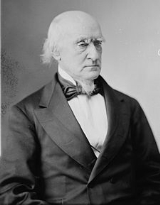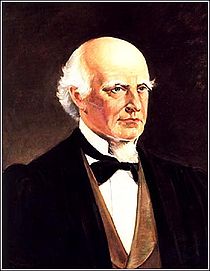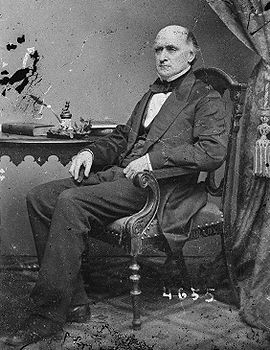
John Archibald Campbell
Encyclopedia
John Archibald Campbell (June 24, 1811 – March 12, 1889) was an American jurist
.
Campbell was born near Washington, Georgia
, to Col. Duncan Greene Campbell (for whom the now-defunct Campbell County, Georgia
was named). Considered a child prodigy
, he graduated from the University of Georgia
in 1825 at the age of 14, and immediately enrolled at the United States Military Academy
for three years and would have graduated in 1830, but withdrew upon the death of his father (July 1828) and returned home to Georgia. He read law with former Georgia governor John Clark
, and was admitted to the bar
in 1829, at the age of 18 which required a special act of the Georgia legislature.
, on 24–25 December 1826, Campbell was involved in the Eggnog Riot
also known as the "Grog Mutiny". Proceedings began on December 26, 1826, courts-martial was complete on 16 March 1827, and ended on May 3, 1827, with the Presidents adjusting of some of the verdicts and approval of the rest. Campbell was among 70 cadets that were involved but a review concluded that only 20 (one soldier) be charged. Many notable cadets such as Jefferson Davis
(involved but not charged), George Bomford
(Expelled on four charges, but allowed to resigned), and Robert E. Lee
(not involved but testified), were involved in the incident. Nine expulsions were approved by President John Quincy Adams
. There was a call for Campbell to be expelled, along with James W. M. "Weems" Berrien (remittance allowed) but this was rejected so Campbell escaped court martial.
, establishing a practice in Montgomery
. There he married Anne Goldthwaite and, in 1836, was elected to the Alabama House of Representatives. In 1839 he moved to Mobile
and resumed private practice, but was elected again to the state legislature in 1843. Campbell was twice offered appointment to the Alabama Supreme Court
, but declined on both occasions.

created a vacancy on the Supreme Court. President Millard Fillmore
, a Whig
, made three nominations to fill the vacancy, all of whom were denied confirmation by the Democratic-controlled Senate
. After the election of Franklin Pierce
, a Democrat, a group of sitting Supreme Court justices approached Pierce to recommend Campbell as a nominee; this is one of the few times sitting justices have made recommendations for new nominations. Pierce, who was hoping to stave off insurrection by appeasing the South, agreed to nominate the Alabaman Campbell. The nomination was made on March 21, 1853, and was approved by the Senate on the same day.
, Simon Cameron
, and the three Confederate
commissioners Martin Crawford
, Andre Roman, and John Forsyth, Jr.. Campbell had been instructed that the Lincoln administration's policy was for peace and reconciliation, not war, but during the meetings Campbell learned that the U.S. government was reinforcing Fort Sumter
and had requested 75,000 volunteers, and Campbell decided that he had been lied to.
, a position he held through the end of the war
. After the fall of Richmond
in 1865, Campbell was arrested and imprisoned at Fort Pulaski, in Georgia, for six months. After his release, he was reconciled and resumed his law practice in New Orleans, Louisiana
. In this private practice he argued a number of cases before the U.S. Supreme Court including the Slaughterhouse Cases
and a number of other cases designed to obstruct Radical Reconstruction in the South.
 Campbell served only eight years on the Supreme Court, though he remained in good health until his death in 1889 and could have served on the court for many years had the Civil War not intervened. He was regarded as a brilliant jurist.
Campbell served only eight years on the Supreme Court, though he remained in good health until his death in 1889 and could have served on the court for many years had the Civil War not intervened. He was regarded as a brilliant jurist.
Jurist
A jurist or jurisconsult is a professional who studies, develops, applies, or otherwise deals with the law. The term is widely used in American English, but in the United Kingdom and many Commonwealth countries it has only historical and specialist usage...
.
Campbell was born near Washington, Georgia
Washington, Georgia
Washington is a city in Wilkes County, Georgia, United States. The population was 4,295 at the 2000 census. The city is the county seat of Wilkes County...
, to Col. Duncan Greene Campbell (for whom the now-defunct Campbell County, Georgia
Campbell County, Georgia
Campbell County, Georgia was a county of the U.S. state of Georgia from 1828 to 1931. It was created by the state legislature on December 20, 1828 from land taken from Fayette, Coweta, and Carroll counties, and from the half of DeKalb County which became Fulton County soon afterward. Georgia's...
was named). Considered a child prodigy
Child prodigy
A child prodigy is someone who, at an early age, masters one or more skills far beyond his or her level of maturity. One criterion for classifying prodigies is: a prodigy is a child, typically younger than 18 years old, who is performing at the level of a highly trained adult in a very demanding...
, he graduated from the University of Georgia
University of Georgia
The University of Georgia is a public research university located in Athens, Georgia, United States. Founded in 1785, it is the oldest and largest of the state's institutions of higher learning and is one of multiple schools to claim the title of the oldest public university in the United States...
in 1825 at the age of 14, and immediately enrolled at the United States Military Academy
United States Military Academy
The United States Military Academy at West Point is a four-year coeducational federal service academy located at West Point, New York. The academy sits on scenic high ground overlooking the Hudson River, north of New York City...
for three years and would have graduated in 1830, but withdrew upon the death of his father (July 1828) and returned home to Georgia. He read law with former Georgia governor John Clark
John Clark (Georgia governor)
John Clark was an American politician.-Career:Clark served in the Georgia House of Representatives prior to being elected to consecutive two-year terms as the 31st Governor from 1820 to 1824.Clark also served in the Georgia Militia during the American Revolution and achieved the rank of Major...
, and was admitted to the bar
Bar association
A bar association is a professional body of lawyers. Some bar associations are responsible for the regulation of the legal profession in their jurisdiction; others are professional organizations dedicated to serving their members; in many cases, they are both...
in 1829, at the age of 18 which required a special act of the Georgia legislature.
Eggnog Riot
While at the United States Military Academy in West Point, New YorkWest Point, New York
West Point is a federal military reservation established by President of the United States Thomas Jefferson in 1802. It is a census-designated place located in Town of Highlands in Orange County, New York, United States. The population was 7,138 at the 2000 census...
, on 24–25 December 1826, Campbell was involved in the Eggnog Riot
Eggnog Riot
The Eggnog Riot, sometimes known as the Grog Mutiny, was a riot that took place at the United States Military Academy in West Point, New York, on 24–25 December 1826. It was caused by the smuggling of whiskey, two days prior to the incident, to make eggnog for a Christmas Day party in the North...
also known as the "Grog Mutiny". Proceedings began on December 26, 1826, courts-martial was complete on 16 March 1827, and ended on May 3, 1827, with the Presidents adjusting of some of the verdicts and approval of the rest. Campbell was among 70 cadets that were involved but a review concluded that only 20 (one soldier) be charged. Many notable cadets such as Jefferson Davis
Jefferson Davis
Jefferson Finis Davis , also known as Jeff Davis, was an American statesman and leader of the Confederacy during the American Civil War, serving as President for its entire history. He was born in Kentucky to Samuel and Jane Davis...
(involved but not charged), George Bomford
George Bomford
George Bomford was an inventor, designer, and distinguished military officer in the United States Army. After graduating from West Point in 1805, as a lieutenant in the Corps of Engineers, he served as assistant engineer on the defenses of New York Harbor until 1808. From 1808 to 1810 George...
(Expelled on four charges, but allowed to resigned), and Robert E. Lee
Robert E. Lee
Robert Edward Lee was a career military officer who is best known for having commanded the Confederate Army of Northern Virginia in the American Civil War....
(not involved but testified), were involved in the incident. Nine expulsions were approved by President John Quincy Adams
John Quincy Adams
John Quincy Adams was the sixth President of the United States . He served as an American diplomat, Senator, and Congressional representative. He was a member of the Federalist, Democratic-Republican, National Republican, and later Anti-Masonic and Whig parties. Adams was the son of former...
. There was a call for Campbell to be expelled, along with James W. M. "Weems" Berrien (remittance allowed) but this was rejected so Campbell escaped court martial.
Alabama
Campbell later moved to AlabamaAlabama
Alabama is a state located in the southeastern region of the United States. It is bordered by Tennessee to the north, Georgia to the east, Florida and the Gulf of Mexico to the south, and Mississippi to the west. Alabama ranks 30th in total land area and ranks second in the size of its inland...
, establishing a practice in Montgomery
Montgomery, Alabama
Montgomery is the capital of the U.S. state of Alabama, and is the county seat of Montgomery County. It is located on the Alabama River southeast of the center of the state, in the Gulf Coastal Plain. As of the 2010 census, Montgomery had a population of 205,764 making it the second-largest city...
. There he married Anne Goldthwaite and, in 1836, was elected to the Alabama House of Representatives. In 1839 he moved to Mobile
Mobile, Alabama
Mobile is the third most populous city in the Southern US state of Alabama and is the county seat of Mobile County. It is located on the Mobile River and the central Gulf Coast of the United States. The population within the city limits was 195,111 during the 2010 census. It is the largest...
and resumed private practice, but was elected again to the state legislature in 1843. Campbell was twice offered appointment to the Alabama Supreme Court
Alabama Supreme Court
The Supreme Court of Alabama is the highest court in the state of Alabama. The court consists of an elected Chief Justice and eight elected Associate Justices. Each justice is elected in partisan elections for staggered six year terms. The Governor of Alabama may fill vacancies when they occur...
, but declined on both occasions.

Supreme Court
In 1852 the death of John McKinleyJohn McKinley
John McKinley was a U.S. Senator from the state of Alabama and an associate justice of the United States Supreme Court.Born in Culpeper County, Virginia, his family moved to Kentucky when he was an infant...
created a vacancy on the Supreme Court. President Millard Fillmore
Millard Fillmore
Millard Fillmore was the 13th President of the United States and the last member of the Whig Party to hold the office of president...
, a Whig
Whig Party (United States)
The Whig Party was a political party of the United States during the era of Jacksonian democracy. Considered integral to the Second Party System and operating from the early 1830s to the mid-1850s, the party was formed in opposition to the policies of President Andrew Jackson and his Democratic...
, made three nominations to fill the vacancy, all of whom were denied confirmation by the Democratic-controlled Senate
United States Senate
The United States Senate is the upper house of the bicameral legislature of the United States, and together with the United States House of Representatives comprises the United States Congress. The composition and powers of the Senate are established in Article One of the U.S. Constitution. Each...
. After the election of Franklin Pierce
Franklin Pierce
Franklin Pierce was the 14th President of the United States and is the only President from New Hampshire. Pierce was a Democrat and a "doughface" who served in the U.S. House of Representatives and the Senate. Pierce took part in the Mexican-American War and became a brigadier general in the Army...
, a Democrat, a group of sitting Supreme Court justices approached Pierce to recommend Campbell as a nominee; this is one of the few times sitting justices have made recommendations for new nominations. Pierce, who was hoping to stave off insurrection by appeasing the South, agreed to nominate the Alabaman Campbell. The nomination was made on March 21, 1853, and was approved by the Senate on the same day.
Impending war
Campbell strongly opposed secession, and in early 1861 served as a mediator between William H. SewardWilliam H. Seward
William Henry Seward, Sr. was the 12th Governor of New York, United States Senator and the United States Secretary of State under Abraham Lincoln and Andrew Johnson...
, Simon Cameron
Simon Cameron
Simon Cameron was an American politician who served as United States Secretary of War for Abraham Lincoln at the start of the American Civil War. After making his fortune in railways and banking, he turned to a life of politics. He became a U.S. senator in 1845 for the state of Pennsylvania,...
, and the three Confederate
Confederate States of America
The Confederate States of America was a government set up from 1861 to 1865 by 11 Southern slave states of the United States of America that had declared their secession from the U.S...
commissioners Martin Crawford
Martin Jenkins Crawford
Martin Jenkins Crawford was an antebellum U.S. Representative and a representative to the Provisional Confederate Congress during the American Civil War from the state of Georgia.-Biography:...
, Andre Roman, and John Forsyth, Jr.. Campbell had been instructed that the Lincoln administration's policy was for peace and reconciliation, not war, but during the meetings Campbell learned that the U.S. government was reinforcing Fort Sumter
Fort Sumter
Fort Sumter is a Third System masonry coastal fortification located in Charleston Harbor, South Carolina. The fort is best known as the site upon which the shots initiating the American Civil War were fired, at the Battle of Fort Sumter.- Construction :...
and had requested 75,000 volunteers, and Campbell decided that he had been lied to.
Court retirement and Confederate appointment
After learning of the reinforcement of Fort Sumter, Campbell resigned from the Court on April 30, 1861, and returned to Alabama. A year later he was named Assistant Secretary of War by Confederate president Jefferson DavisJefferson Davis
Jefferson Finis Davis , also known as Jeff Davis, was an American statesman and leader of the Confederacy during the American Civil War, serving as President for its entire history. He was born in Kentucky to Samuel and Jane Davis...
, a position he held through the end of the war
American Civil War
The American Civil War was a civil war fought in the United States of America. In response to the election of Abraham Lincoln as President of the United States, 11 southern slave states declared their secession from the United States and formed the Confederate States of America ; the other 25...
. After the fall of Richmond
Richmond, Virginia
Richmond is the capital of the Commonwealth of Virginia, in the United States. It is an independent city and not part of any county. Richmond is the center of the Richmond Metropolitan Statistical Area and the Greater Richmond area...
in 1865, Campbell was arrested and imprisoned at Fort Pulaski, in Georgia, for six months. After his release, he was reconciled and resumed his law practice in New Orleans, Louisiana
New Orleans, Louisiana
New Orleans is a major United States port and the largest city and metropolitan area in the state of Louisiana. The New Orleans metropolitan area has a population of 1,235,650 as of 2009, the 46th largest in the USA. The New Orleans – Metairie – Bogalusa combined statistical area has a population...
. In this private practice he argued a number of cases before the U.S. Supreme Court including the Slaughterhouse Cases
Slaughterhouse Cases
The Slaughter-House Cases, were the first United States Supreme Court interpretation of the relatively new Fourteenth Amendment to the Constitution...
and a number of other cases designed to obstruct Radical Reconstruction in the South.


